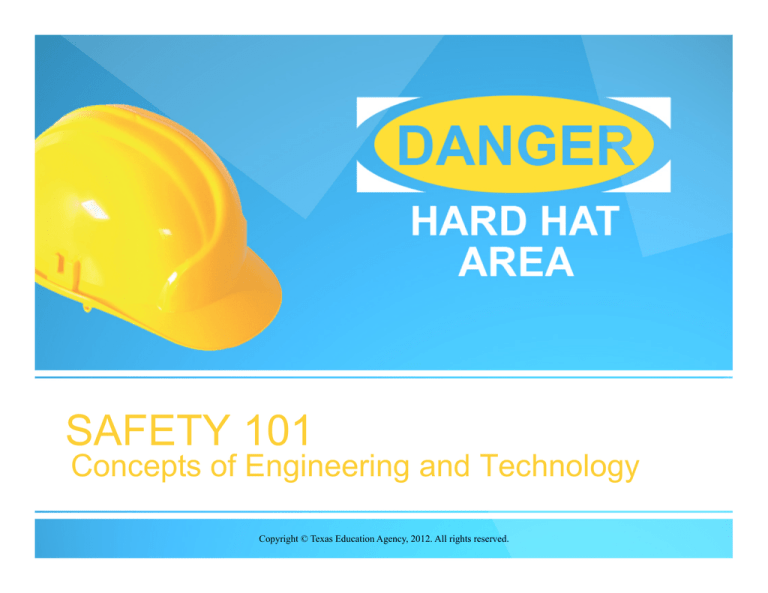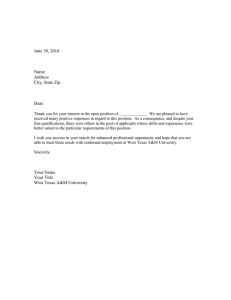
SAFETY 101
Concepts of Engineering and Technology
Copyright © Texas Education Agency, 2012. All rights reserved.
Why must we all know Safety?
• This isn’t a Manufacturing class. Why do I
need to know Safety?
– Because as future Architects, Engineers,
Designers, Chefs, etc., YOU need to know how
to stay safe on the job site.
– You need to know your rights and
responsibilities as Employees and/or
Employer.
Copyright © Texas Education Agency, 2012. All rights reserved.
Paper Cutter
• Never remove the guard from the paper
cutter or any tool!
• Keep fingers AWAY
from the cutter
path.
• Only cut paper
products on it.
Copyright © Texas Education Agency, 2012. All rights reserved.
Hobby/X-acto Knife
• Never throw an X-acto knife.
• Only carry them when they have a safety
cap on them.
• Only use sharp blades. Wrap
dull blades
in paper before you throw
them away.
• Always cut away from yourself or others.
• Use a cutting pad whenever possible to protect
surfaces.
Copyright © Texas Education Agency, 2012. All rights reserved.
Scissors
• Never run when carrying
scissors.
• Carry scissors with pointed end
facing down.
• Always cut away from yourself
and others.
Copyright © Texas Education Agency, 2012. All rights reserved.
Hot Glue Gun
• Its called a HOT glue gun for a reason, the
glue can and will burn you!
• Only put in it the correct size plastic glue
sticks.
• Let it cool completely before touching the
metal tip or glue.
Copyright © Texas Education Agency, 2012. All rights reserved.
Poison
• Keep the Poison Help yuck face
sticker near your phone and/or
on poisonous items.
• Keep even potentially
poisonous items locked up
secure and out of sight.
• Wash your hands after handling
anything that could even be
poisonous.
Copyright © Texas Education Agency, 2012. All rights reserved.
HAZMAT
• Hazardous Materials like paint
thinner or finger nail polish
remover should never be
thrown down the drain. It needs
to go to proper collection site,
just like used auto oil.
• Wash your hands after handling
HAZMATS or any material that
you think could be hazardous.
Better safe than sorry.
Copyright © Texas Education Agency, 2012. All rights reserved.
Wash Hands
• You should wash your
hands with soap for at
least 20 seconds and
then rinse with water and
dry with a towel.
• HINT: Sing the “Alphabet
Song” - by the time you
are done singing it will be
20 seconds.
Copyright © Texas Education Agency, 2012. All rights reserved.
Fire
• Know your fire route out of every
room or building.
• If there is a fire, get everyone out.
• Once everyone is out, call 911.
• If it’s a small fire, attempt to put it out with
the appropriate fire extinguisher.
Copyright © Texas Education Agency, 2012. All rights reserved.
Fire
• Know where the fire extinguisher is
before there is a fire.
• Follow “PASS” procedures when using it.
– Pull out the pin;
– Aim the nozzle at the base of the fire;
– Squeeze the handle; you only have approximately 30
seconds of spray;
– Sweep back and forth as you spray.
Copyright © Texas Education Agency, 2012. All rights reserved.
Safety Colors
•
•
•
•
Red = Fire
Orange = Dangerous
Yellow = Caution or Slow Down
Blue= Don’t move it or its being
repaired
• Purple = Radiation concerns
• White and/or Black = Traffic flow
Copyright © Texas Education Agency, 2012. All rights reserved.
Drafting Tools
• This is a T-square.
• We use it to keep paper lined up.
• It is NOT a sword or pretend gun.
Copyright © Texas Education Agency, 2012. All rights reserved.
Drafting Tools
• This is a measuring scale.
• We use it to draw to precise
measurements and/or to scale.
• It is NOT used as a pretend
sword or drum sticks.
Copyright © Texas Education Agency, 2012. All rights reserved.
Drafting Tools
• This is a divider.
• We use it to transfer measurements.
• It is NOT used to poke holes in paper
or to draw blood from people.
Copyright © Texas Education Agency, 2012. All rights reserved.
Drafting Tools
• This is a Bow Compass.
• We use it to draw precise circles and arcs.
• We do NOT use it to poke holes
in paper or our
classmates.
Copyright © Texas Education Agency, 2012. All rights reserved.
Drafting Tools
• These are examples of drafting
templates.
• We use them to draw shapes
quickly and correctly.
• We do NOT use them to twirl on
our fingers or to hit classmates
with.
Copyright © Texas Education Agency, 2012. All rights reserved.
Drafting Tools
• These are the 30/60 and 45
triangles.
• We use them to draw straight
lines and accurate angles.
• We do NOT use them as
throwing stars or to hit our classmates with.
Copyright © Texas Education Agency, 2012. All rights reserved.
General
•
•
•
•
•
If you spill something, clean it up ASAP.
Use only a brush to clean off tables.
Keep aisles clear of trash, tools, etc.
Keep drawers and cabinets closed.
Report immediately any accident no matter
how small. Yes, even paper cuts.
Copyright © Texas Education Agency, 2012. All rights reserved.
General
• If a tool has become dull or isn’t working
properly, let your teacher know ASAP.
• Make sure your hands and work area are
DRY before you use electrical equipment.
• If a cord is frayed or damaged, do NOT use
it – report it.
• Always unplug equipment via the plug only.
Copyright © Texas Education Agency, 2012. All rights reserved.
General
• Know where cords are at all times to avoid
tripping.
• You can tape down Ethernet cords only.
• NEVER tape down electrical cords as this
can cause them to heat up and catch on
FIRE!
Copyright © Texas Education Agency, 2012. All rights reserved.
General
• Only use tools like the paper cutter, hot
glue, etc., when your teacher is present.
• Always ask permission to use a tool before
you actually use it.
• If you aren’t sure how to use something,
ASK!
• Return tools to where they belong, not
necessarily where you got it.
Copyright © Texas Education Agency, 2012. All rights reserved.
General
• When lifting things, lift with your legs NOT
your back.
• Get help to lift really heavy or bulky things.
• Only use things like spray paint in a well
ventilated area. Store them in the fire
resistant cabinet only. Store rags with
chemical on them in a flame proof
container.
Copyright © Texas Education Agency, 2012. All rights reserved.
ANSI
• American National Standards Institute
• www.ansi.org
• Their mission is: To enhance both the global
competitiveness of U.S. business and the U.S.
quality of life by promoting and facilitating
voluntary consensus standards and conformity
assessment systems, and safeguarding their
integrity.
Copyright © Texas Education Agency, 2012. All rights reserved.
OSHA
• Occupational Safety and Health Admin.
• www.osha.giv
• Their mission is: With the Occupational Safety and Health
Act of 1970, Congress created the Occupational Safety
and Health Administration (OSHA) to ensure safe and
healthful working conditions for working men and women
by setting and enforcing standards and by providing
training, outreach, education and assistance.
Copyright © Texas Education Agency, 2012. All rights reserved.
MSDS
• Material Safety Data Sheets
• A material safety data sheet (MSDS) is a form with data regarding the
properties of a particular substance. An important component
of product stewardship and workplace safety, it is intended to provide
workers and emergency personnel with procedures for handling or
working with that substance in a safe manner, and includes
information such as physical data (melting point, boiling point, flash
point, etc.), toxicity, health effects, first aid, reactivity, storage,
disposal, protective equipment, and spill-handling procedures. MSDS
formats can vary from source to source within a country depending on
national requirements.
Copyright © Texas Education Agency, 2012. All rights reserved.
NFPA
• National Fire Protection Association
• http://www.nfpa.org/
• The mission of the international nonprofit
NFPA, established in 1896, is to
reduce the worldwide burden of fire
and other hazards on the quality of life
by providing and advocating consensus
codes and standards, research, training,
and education.
Copyright © Texas Education Agency, 2012. All rights reserved.
NFPA - Red
• Red = Fire Hazard
– 0 – Will not burn
– 1 – Must be preheated for
ignition; flashpoint above 200°F
(93°C)
– 2 – Must be moderately heated
for ignition, flashpoint above
100°F (38°C)
– 3 – Ignition may occur under
most ambient conditions,
flashpoint below 100°F (38°C)
– 4 – Extremely flammable and will
readily disperse through air under
standard conditions, flashpoint
below 73°F (23°C)
Copyright © Texas Education Agency, 2012. All rights reserved.
NFPA - Blue
• Blue = Health Hazard
– 0 – Hazard no greater than
ordinary material
– 1 – May cause irritation; minimal
residual injury
– 2 – Intense or prolonged
exposure may cause
incapacitation; residual injury
may occur if not treated
– 3 – Exposure could cause
serious injury even if treated
– 4 – Exposure may cause death
Copyright © Texas Education Agency, 2012. All rights reserved.
NFPA - Yellow
• Yellow = Reactivity Hazard
– 0 – Stable
– 1 – May become unstable at elevated
temperatures and pressures, may be
mildly water reactive
– 2 – Unstable; may undergo violent
decomposition, but will not detonate.
May form explosive mixtures with
water
– 3 – Detonates with strong ignition
source
– 4 – Readily detonates
Copyright © Texas Education Agency, 2012. All rights reserved.
NFPA – White &/or Black
• White – Special Hazard
–
- Reacts to water, do
not use around water!
– Acid
– ALK- Alkaline
– COR – Corrosive
– SA – Simple Asphyxiates
–
- Radiation
Copyright © Texas Education Agency, 2012. All rights reserved.
Fire Symbols
• The types mean it is
SAFE to use on:
– Type A = Trash,
Wood, Paper
– Type B =
Flammable Liquids
– Type C = Electrical
Fire
Copyright © Texas Education Agency, 2012. All rights reserved.
Personal Protection Equipment
(PPE) Symbols
• Wear protective
clothing
• Wear protective
gloves
• Wear protective
boots
• Wear protective
breathing mask
• Wear safety
glasses, goggles,
&/or face
shield.
• First aid
supplies
are in here!
Copyright © Texas Education Agency, 2012. All rights reserved.
Caution Safety Symbols
• These are just 9 of the
most common caution
symbols, there are many
more:
– Explosions
– Electricity
– Radiation
– Heat/Thermal
– Cold
– Fire
– Bio Hazard
– Slippery
– Hand Injuries
Copyright © Texas Education Agency, 2012. All rights reserved.
100% Rule
• Why do I have to pass the 50 questions
test with 100%?
• Because that means you will still have
every finger, toe, etc., safe. 90% means
it’s okay to lose 1 finger, 95% = part of a
finger, etc….
Copyright © Texas Education Agency, 2012. All rights reserved.

